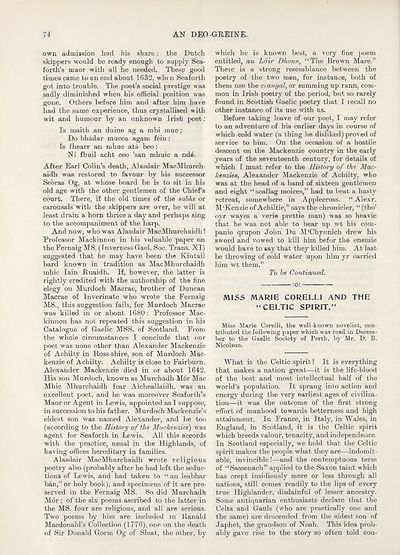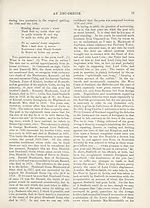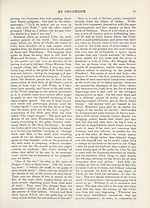An Comunn Gàidhealach Publications > Deo-gréine > Volume 13, October 1917-September 1918
(82) Page 74
Download files
Complete book:
Individual page:
Thumbnail gallery: Grid view | List view

74
AN DEO-GREINE.
own admission had his share : the Dutch
skippers would be ready enough to supply Sea-
forth’s maor with all he needed. These good
times came to an end about 1632, when Seaforth
got into trouble. The poet’s social prestige was
sadly diminished when his official position was
gone. Others before him and after him have
had the same experience, thus crystallised with
wit and humour by an unknown Irish poet:
Is maith an duine ag a mbi muc;
Do bhadar mucca agam fein :
Is fhearr an mhuc ata beo:
Ni fhuil acht ceo ’san mhuic a nde.
After Earl Colin’s death, Alasdair MacMhurch-
aidh was restored to favour by his successor
Sebras Og, at whose board he is to sit in his
old age with the other gentlemen of the Chief’s
court. There, if the old times of the sabhs or
carousals with the skippers are over, he will at
least drain a horn thrice a day and perhaps sing
to the accompaniment of the harp.
And now, who was Alasdair MacMhurchaidh?
Professor Mackinnon in his valuable paper on
the FernaigMS. (InvernessGael. Soc. Trans. XI)
suggested that he may have been the Kin tail
bard known in tradition as MacMhurchaidh
mine Iain Ruaidh. If, however, the latter is
rightly credited with the authorship of the fine
elegy on Murdoch Macrae, brother of Duncan
Macrae of Inverinate who wrote the Fernaig
MS., this suggestion fails, for Murdoch Macrae
was killed in or about 1680: Professor Mac¬
kinnon has not repeated this suggestion in his
Catalogue of Gaelic MSS. of Scotland. From
the whole circumstances I conclude that our
poet was none other than Alexander Mackenzie
of Achilty in Ross-shire, son of Murdoch Mac¬
kenzie of Achilty. Achilty is close to Fairburn.
Alexander Mackenzie died in or about 1642.
His son Murdoch, known as Murchadh M6r Mac
Mhic Mhurchaidh fear Aicheallaidh, was an
excellent poet, and he was moreover Seaforth’s
Maor or Agent in Lewis, appointed as I suppose,
in succession to his father. Murdoch Mackenzie’s
eldest son was named Alexander, and he too
(according to the History of the Mackenzies) was
agent for Seaforth in Lewis. All this accords
with the practice, usual in the Highlands, of
having offices hereditary in families.
Alasdair MacMhurchaidh wrote religious
poetry also (probably after he had left the seduc¬
tions of Lewis, and had taken to “an leabhar
ban,” or holy book), and specimens of it are pre¬
served in the Fernaig MS. So did Murchadh
Mor; of the six poems ascribed to the latter in
the MS. four are religious, and all are serious.
Two poems by him are included in Ranald
Macdonald’s Collection (1776), one on the death
of Sir Donald Gorm Og of Sleat, the other, by
which he is known best, a very fine poem
entitled, an Lair Dhonn, “The Brown Mare.”
There is a strong resemblance between the
poetry of the two men, for instance, both of
them use the ctangal, or summing up rann, com¬
mon in Irish poetry of the period, but so rarely
found in Scottish Gaelic poetry that I recall no
other instance of its use with us.
Before taking leave of our poet, I may refer
to an adventure of his earlier days in course of
which cold water (a thing he disliked) proved of
service to him. On the occasion of a hostile
descent on the Mackenzie country in the early
years of the seventeenth century, for details of
which I must refer to the History of the Mac¬
kenzies, Alexander Mackenzie of Achilty, who
was at the head of a band of sixteen gentlemen
and eight “scallag moires,” had to beat a hasty
retreat, somewhere in Applecross. “ Alexr.
M'Kenzie of Achiltie,” says the chronicler, “ (tho’
oyr wayes a verie prettie man) was so heavie
that he was not able to bear up wt his eom-
panie qrupon John Du M'Chynnich drew his
sword and vowed to kill him befor the enemie
would have to say that they killed him. At last
be throwing of cold water upon him yr carried
him wt them.”
To be Continued.
MISS MARIE CORELLI AND THE
“CELTIC SPIRIT.”
Miss Marie Corelli, the well-known novelist, con¬
tributed the following paper which was read in Decem¬
ber to the Gaelic Society of Perth, by Mr. D. B.
Nicolson.
What is the Celtic spirit? It is everything
that makes a nation great—it is the life-blood
of the best and most intellectual half of the
world’s population. It sprang into action and
energy during the very earliest ages of civiliza¬
tion—it was the outcome of the first strong
effort of manhood towards betterness and high
attainment. In France, in Italy, in Wales, in
England, in Scotland, it is the Celtic spirit
which breeds valour, tenacity, and independence.
In Scotland especially, we hold that the Celtic
spirit makes the people what they are—indomit¬
able, invincible!—and the contemptuous term
of “Sassenach” applied to the Saxon taint which
has crept insidiously more or less through all
nations, still comes readily to the lips of every
true Highlander, disdainful of lesser ancestry.
Some antiquarian enthusiasts declare that the
Celts and Gauls (who are practically one and
the same) are descended from the eldest son of
Japhet, the grandson of Noah. This idea prob¬
ably gave rise to the story so often told con-
AN DEO-GREINE.
own admission had his share : the Dutch
skippers would be ready enough to supply Sea-
forth’s maor with all he needed. These good
times came to an end about 1632, when Seaforth
got into trouble. The poet’s social prestige was
sadly diminished when his official position was
gone. Others before him and after him have
had the same experience, thus crystallised with
wit and humour by an unknown Irish poet:
Is maith an duine ag a mbi muc;
Do bhadar mucca agam fein :
Is fhearr an mhuc ata beo:
Ni fhuil acht ceo ’san mhuic a nde.
After Earl Colin’s death, Alasdair MacMhurch-
aidh was restored to favour by his successor
Sebras Og, at whose board he is to sit in his
old age with the other gentlemen of the Chief’s
court. There, if the old times of the sabhs or
carousals with the skippers are over, he will at
least drain a horn thrice a day and perhaps sing
to the accompaniment of the harp.
And now, who was Alasdair MacMhurchaidh?
Professor Mackinnon in his valuable paper on
the FernaigMS. (InvernessGael. Soc. Trans. XI)
suggested that he may have been the Kin tail
bard known in tradition as MacMhurchaidh
mine Iain Ruaidh. If, however, the latter is
rightly credited with the authorship of the fine
elegy on Murdoch Macrae, brother of Duncan
Macrae of Inverinate who wrote the Fernaig
MS., this suggestion fails, for Murdoch Macrae
was killed in or about 1680: Professor Mac¬
kinnon has not repeated this suggestion in his
Catalogue of Gaelic MSS. of Scotland. From
the whole circumstances I conclude that our
poet was none other than Alexander Mackenzie
of Achilty in Ross-shire, son of Murdoch Mac¬
kenzie of Achilty. Achilty is close to Fairburn.
Alexander Mackenzie died in or about 1642.
His son Murdoch, known as Murchadh M6r Mac
Mhic Mhurchaidh fear Aicheallaidh, was an
excellent poet, and he was moreover Seaforth’s
Maor or Agent in Lewis, appointed as I suppose,
in succession to his father. Murdoch Mackenzie’s
eldest son was named Alexander, and he too
(according to the History of the Mackenzies) was
agent for Seaforth in Lewis. All this accords
with the practice, usual in the Highlands, of
having offices hereditary in families.
Alasdair MacMhurchaidh wrote religious
poetry also (probably after he had left the seduc¬
tions of Lewis, and had taken to “an leabhar
ban,” or holy book), and specimens of it are pre¬
served in the Fernaig MS. So did Murchadh
Mor; of the six poems ascribed to the latter in
the MS. four are religious, and all are serious.
Two poems by him are included in Ranald
Macdonald’s Collection (1776), one on the death
of Sir Donald Gorm Og of Sleat, the other, by
which he is known best, a very fine poem
entitled, an Lair Dhonn, “The Brown Mare.”
There is a strong resemblance between the
poetry of the two men, for instance, both of
them use the ctangal, or summing up rann, com¬
mon in Irish poetry of the period, but so rarely
found in Scottish Gaelic poetry that I recall no
other instance of its use with us.
Before taking leave of our poet, I may refer
to an adventure of his earlier days in course of
which cold water (a thing he disliked) proved of
service to him. On the occasion of a hostile
descent on the Mackenzie country in the early
years of the seventeenth century, for details of
which I must refer to the History of the Mac¬
kenzies, Alexander Mackenzie of Achilty, who
was at the head of a band of sixteen gentlemen
and eight “scallag moires,” had to beat a hasty
retreat, somewhere in Applecross. “ Alexr.
M'Kenzie of Achiltie,” says the chronicler, “ (tho’
oyr wayes a verie prettie man) was so heavie
that he was not able to bear up wt his eom-
panie qrupon John Du M'Chynnich drew his
sword and vowed to kill him befor the enemie
would have to say that they killed him. At last
be throwing of cold water upon him yr carried
him wt them.”
To be Continued.
MISS MARIE CORELLI AND THE
“CELTIC SPIRIT.”
Miss Marie Corelli, the well-known novelist, con¬
tributed the following paper which was read in Decem¬
ber to the Gaelic Society of Perth, by Mr. D. B.
Nicolson.
What is the Celtic spirit? It is everything
that makes a nation great—it is the life-blood
of the best and most intellectual half of the
world’s population. It sprang into action and
energy during the very earliest ages of civiliza¬
tion—it was the outcome of the first strong
effort of manhood towards betterness and high
attainment. In France, in Italy, in Wales, in
England, in Scotland, it is the Celtic spirit
which breeds valour, tenacity, and independence.
In Scotland especially, we hold that the Celtic
spirit makes the people what they are—indomit¬
able, invincible!—and the contemptuous term
of “Sassenach” applied to the Saxon taint which
has crept insidiously more or less through all
nations, still comes readily to the lips of every
true Highlander, disdainful of lesser ancestry.
Some antiquarian enthusiasts declare that the
Celts and Gauls (who are practically one and
the same) are descended from the eldest son of
Japhet, the grandson of Noah. This idea prob¬
ably gave rise to the story so often told con-
Set display mode to:
![]() Universal Viewer |
Universal Viewer | ![]() Mirador |
Large image | Transcription
Mirador |
Large image | Transcription
| An Comunn Gàidhealach > An Comunn Gàidhealach Publications > Deo-gréine > Volume 13, October 1917-September 1918 > (82) Page 74 |
|---|
| Permanent URL | https://digital.nls.uk/125233085 |
|---|
| Description | Leabhar 13, Mìos Deireannach an Fhogharaidh 1917 gu Darna Mìos an Fhogharaidh 1918 |
|---|---|
| Attribution and copyright: |
|
| Description | This contains items published by An Comunn, which are not specifically Mòd-related. It includes journals, annual reports and corporate documents, policy statements, educational resources and published plays and literature. It is arranged alphabetically by title. |
|---|
| Description | A collection of over 400 items published by An Comunn Gàidhealach, the organisation which promotes Gaelic language and culture and organises the Royal National Mòd. Dating from 1891 up to the present day, the collection includes journals and newspapers, annual reports, educational materials, national Mòd programmes, published Mòd literature and music. |
|---|---|
| Additional NLS resources: |
|

